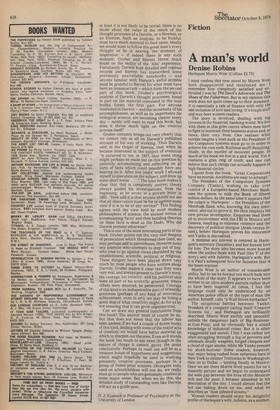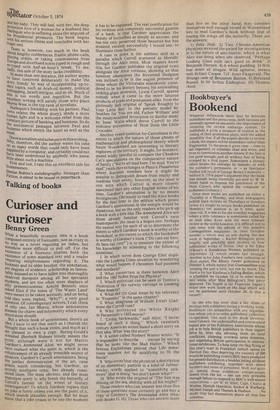Fiction
A man's world
Denise Robins
Harlequin Morris West (Collins £2.75) I must confess this new novel by Morris West both disappointed and interested me. I remember how completely satisfied and enthralled I was by The Devil's Advocate and The Shoes of the Fisherman. But in my opinion this work does not quite come up to their standard. It is essentially a tale of finance with only the odd inclusion of love and loving. It's tough stuff and may bore women readers.
The story is involved, dealing with big tycoons in the financial, banking world. We live with them in this grim centre where men have to fight to maintain their business status and, at times, their very lives. One realises what terrible lengths a man such as the President of the Computors Systems must go to in order to achieve his own ends. Ruthless stuff! Resulting, finally, in the murder of innocent people. In much of the book we live in a sick world. Yet it contains a grim ring of truth, and one can believe that such things can actually happen in high financial circles.
I quote from the book: "Great Corporationso have no morals. Accidents are easy to arrange.'
The President of the Computors Systems Company (Yanko), wishing to take over control of a European-based Merchant Bank, uses the system to milk the Bank of fifteen million dollars. At the same time it appears that the culprit is 'Harlequin' — the President of the Merchant Bank who, knowing his own innocence, sets out to prove it. He then employs his own private investigator. Enquiries lead them all to involvement with the FBI in Mexico and Geneva, resulting in extreme violence and the discovery of political intrigue (Arab-versus-Israeli), before Harlequin proves his innocence and Yanko is discredited.
A minimal sex interest is centred in Harlequin's secretary (Suzanne), and her honest love for him. The story also becomes more human when the author deals with Paul (the 'I' of the story), and with Juliette, Harlequin's wife. But it is Paul's subsequent love for Suzanne that is the heart-warmer.
Morris West is an author of considerable ability, but to me he has put too much bulk into the whole of the story. It appears to have been written to an ultra-modern pattern rather than to have been inspired. At times, I feel the language could only be understood by an American police officer or the type of man the author, himself, calls "a Wall Street barbarian"!
The occasional battles between Yanko, President of a company calling itself 'Creative Systems Inc.,' and Harlequin are brilliantly described. Morris West swiftly and smoothly unfolds the dangerous path of Big-Businessat-Gun-Point, and he obviously has a sound knowledge of industrial crime. But it is often exaggerated and unreal. I felt I was rather too often struggling through a fog of perverts and criminals, deadly weapons, forged cheques and a cloud of cigar smoke, while Mr Yanko presses his shock-buttons! Some readers, however, may enjoy being rushed from nefarious bars in New York to sinister Trattorias in Washington, then on to Dallas — landing finally in Mexico. Once we are there Morris West paints for us a masterly picture and we begin to understand the wide gap between the lives of the Mexican rich and the poor. I became absorbed in his description of the city. I could almost feel the hot sun baking down on me, and what he describes as "dust infested streets," Women readers should enjoy his delightful profile of Harlequin's wife, Juliette, as a mother, arid her baby. They will feel, with her, the deep protective love of a woman for a husband like Harlequin who is suffering alone the anguish of his Presidential pressures, The book begins with his serious illness and concludes with her tragic end.
There is, however, too much in the book about lengthy conferences, frantic phone-calls, Placing orders, or taking commissions from Europe and shorthand notes typed in rough and re-typed with half-an-hour's break. To me,
sadly, this side of the story lacks credibility.
In more than one instance, the author seems to have contrived deliberately to make the
story 'trendy' by way of incorporating up-todate topics, such as Arab-oil money, political kidnapping, Israeli intrigue, and so on. Much of this is too wordy and repetitive. But the
excellent writing will satisfy those who place Morris West in the top rank of novelists. Harlequin's friendship with his partner, Paul (who relates the whole story), sheds a more human light and is a welcome relief from the constant picture of banking and business. So do the sentimental passages between Paul and Suzanne which enrich the heart as well as the mind.
Thereis a realism and substan ce in this writing. Why, therefore, did the author waste his time on so many words that could only have been supplied by a computor, and certainly could not have been understood by anybody who knew little about such a machine.
First and last, I rate this an excellent tale for businessmen.
Denise Robins's autobiography. Stranger than Fiction, is about to be issued in paperback.

































 Previous page
Previous page